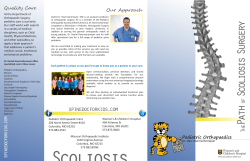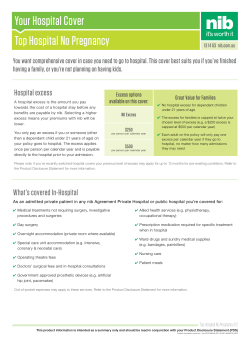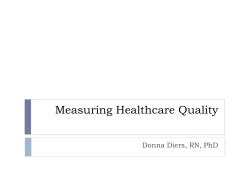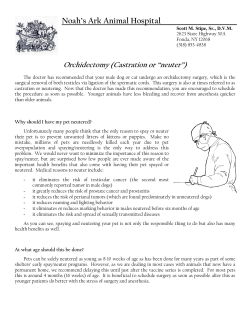
Special care for children. & ZAHLEN
ZAHLEN & FAKTEN Special care for children. ABOUT US Leading medical care for children The Children’s Hospital Zurich is the largest university children’s hospital in Switzerland and one of the leading centres of paediatrics in Europe. Its 2,000 committed staff are de dicated to the health care needs of almost 100,000 young patients from the day they are born to the age of 18. Facts and figures 7 medical and surgical wards: 114 beds General intensive care unit: 9 beds Cardiac intensive care unit: 9 beds Intermediate care unit: 6 beds Specialist neonatal unit: 16 beds Bone marrow transplant unit: 5 isolation wards Rehabilitation centre Affoltern am Albis: 47 beds Psychosomatic ward: 13 beds Roughly 7,000 inpatients a year Approximately 6,000 operations a year Accident and emergency: roughly 30,000 patients a year Polyclinic and outpatient consultations: over 70,000 a year Research Centre for Children (FZK) with international research teams Roughly 2,000 employees 500 doctors, 700 health care personnel 450 qualified medical and therapeutic staff (therapies, lab, pharmacy), 350 staff in house-keeping/catering, facility management, IT and administration The work ethos of the hospital founded in 1874, which is funded by the privately run Eleonore Foundation, is defined by high-quality medical care and interdisciplinary international collaboration. With its roughly 30 departments and stateof-the-art medical equipment, the Children’s Hospital Zurich is listed as a Canton of Zurich listed hospital for the entire range of paediat ric and paediatric surgery treatments. The Swiss Conference of Cantonal Health Directors has also exclusively classified the Children’s Hospital Zurich for some impor tant parts of highly specialised medicine. These include the services of the burns centre for children and the specialist consultations for children with congenital immunodeficiency. The addition of its own rehabilitation centre in Affoltern am Albis and the psychosomatic psychiatry treatment unit with a focus on eat ing disorders is also unique within Europe. The Research Centre for Children, with teams of researchers with an international reputa tion who are dedicated to clinic translational research, is also one of a kind in Switzerland. INDIVIDUAL CARE Highly specialised expertise and devotion for a premature baby Tailor-made treatment When many children and adults hear the word accident and emer gency, their first thoughts are often flashing blue lights and the A&E ward. Roughly 30,000 patients get to know the Children’s Hospital Zurich through the A&E ward every year. One in nine emergency admissions results in an inpatient stay of at least 24 hours on one of the wards or intensive care units. A child who is not admitted to the hospital via an emergency admis sion, receives a tailor-made treat ment plan in advance, which also takes into account the family and school situation. The most common models are: an appointment at one of the over 30 specialist consulta tions at the polyclinic, a carefully planned hospital stay of more than one day for an operation, treatment at the day clinic for chemotherapy or blood purification with dialysis. In all cases the principle is: treat ment teams do everything possible to leave children in their familiar surroundings as long as possible and return them there as quickly as possible. The Children’s Hospital sees parents as being one of the most important factors for a speedy recovery. It allows and encourages parents to be with their children round the clock and uses outpatient treatments, wherever they are medically viable and reasonable for children and parents. 1 2 PHILOSOPHY Our heart beats for children The Children’s Hospital Zurich has a holistic approach towards health: physical, pastoral and psychological. The well-being of our young patients is at the heart of the treat ment, regardless of their gender, religion and social background. The Children’s Hospital Zurich is a place where newborns, children and young people up to 18 years of age, as well as their parents and family members, are diligently cared for and supported. The central focus is always on the child, who with its parents and family members is cared for by an interdisciplinary treatment team of doctors, care profes sionals, physiotherapists, occupational therapists and counsellors. The well-orchestrated tacit knowledge of children and adolescents and their family members is what makes the Children’s Hospital Zurich what it is: a unique place where dedicated people meet sick children and adolescents from different backgrounds in their everyday work. Doctors, care and therapy staff are very aware that this can only succeed with a great deal of understanding and per sonal motivation. The teams receive professional support in coping with particularly stressful situations. 3 Collaboration goes way beyond this close-knit treatment team and also encompasses the following professional groups and services: – Critical care teams – Hospital school and nursery for patients – Hospital clowns in cooperation with the Theodora Foundation – Pastoral care team –Volunteers – Dietary requirements – Parent accommodation – Support for siblings 4 1 | Intermediate care 2 | Clown doctor Klein on a visit 3 | Occupational therapy 4 | Assessing pain EXPERTISE Broad expertise with specialisms The Children’s Hospital Zurich has an internationally recognised leading role in six specialist fields: – Cardiology, cardiac surgery and cardiac diagnostic imaging – Neonatal surgery and surgery for deformities – Neurology and neurosurgery including neurorehabilitation – Oncology/hematology and immunology including surgical oncology and bone marrow transplants – Metabolism and endocrinology including newborn screening – Burns, reconstructive plastic surgery We have some exclusive national service mandates in the field of highly specialised medicine fields. Summary of all the medical services at the Children’s Hospital Zurich Paediatric medicine Paediatric surgery Psychosomatic Adolescent medicine Foetal surgery Eating disorders Allergology Hand surgery Dissociative disorders General paediatrics Cardiac surgery Somatoform disorders Dermatology Craniofacial surgery Endocrinology/diabetology Cleft lip and palate surgery Disorders in babies and toddlers Developmental paediatrics Neurosurgery including moyamoya centre Interdisciplinary services Ophthalmic surgery Anaesthesia Orthopaedic surgery Diagnostic imaging Otolaryngology Intensive care Plastic and reconstructive surgery Child protection Gastroenterology Gynaecology Haematology Immunology Infectiology Cardiology Bone marrow transplants Neonatology Nephrology Neurology/neuropsychology Oncology Pulmonology Rheumatology Metabolic disorders Traumatology Urology Burns surgery Visceral surgery Spinal surgery Dental surgery Laboratory medicine Palliative care Emergency medicine Rehabilitation Hospital pharmacy (pharmaceutical services) Patient and mother in an isolation unit after a bone marrow transplant EQUIPMENT Attracting the latest diagnostics technology As a training hospital with research mandate, the Children’s Hospital Zurich has state-of-the-art equip ment and uses new, less invasive procedures. For example, in diagnostics imaging it is particularly important with children to keep exposure to radiation as low as possible. Equipment manufacturers are appreciative of the expertise and scientific environment at the Children’s Hospital Zurich and Low-radiation cardiac catheter lab: the only reference installation in the world from Philips for paediatrics provide pilot installations in order to develop pioneering diagnosis methods together with clinical personnel. EDUCATION Further and higher training for the benefit of the child The Children’s Hospital Zurich places great emphasis on further and higher medical training focused on children, adolescents and their families. Besides students, roughly 100 junior doctors qualify as con sultants in general and specialist paediatrics as well as paediatric surgery at the children’s hospital. Even though the Children’s Hospital Zurich allows newly qualified personnel to move on to other children’s hospitals and paediatric surgeries with mixed feelings, it is proud to actively contribute to solving the problem of a shortage of paediatric and paediatric surgery talent in Switzerland. Thanks to its work as a training hospital, an extensive network has resulted over the course of the years, which is one of a kind. The Children’s Hospital Zurich is the largest training institute specia lising in caring for children and adolescents in health care education and training. It provides attractive training placements for different health care professions from health specialists, to care personnel, to specialists in the field of lab work and diagnostics imaging. Training placements for health professions Human medicine students Care personnel Lectures440 Specialist college 45 Practical courses University of applied sciences 10 For intensive care 24 Elective year 120 75 Doctoral students60 For emergency care 2 For anaesthesia 1 Medical and biomedical labs 6 Operation technology 2 Physiotherapy 3 Occupational therapy 2 Nutritional advice 2 Consultants Paediatrics75 Paediatric surgery 4 Health specialists 35 RESEARCH & DEVELOPMENT Today’s research, tomorrow’s health The Children’s Hospital Zurich runs a Research Centre for Children which is one of its kind in Switzerland. It pursues the aim of making the latest scientific findings available to children and adolescents in their treatment. The research centre’s specific tasks include pooling, coordinating and promoting scientific research at the Children’s Hospital Zurich. Our international team tackles topics such as developmental and life processes, con genital and acquired diseases, deformities and the results of accidents, as well as prevention. The aim is to immediately integrate the insight gained into clinical treatments in practice and in doing so meet the specific needs of children and adolescents and their families. The research focuses on genetic disorders, cancer research, nerve disorders, transplant research and immunology. However, the mission goes beyond cantonal and national borders: it is important to make the research results accessible to lessprivileged or developed societies as well. Researchers at the Research Centre for Children are therefore committed to the principle of: Today’s research, tomorrow’s health. Robotic gait therapy device (Lokomat) at the rehabilitation centre Affoltern am Albis NEW BUILDING The winning project by the architects Herzog & de Meuron New building secures the future The Children’s Hospital Zurich was founded in the Zurich residential area of Hottingen in 1874, amidst vineyards and orchards, with just 30 beds. The number of patients has increased considerably since then. Today’s site and the existing infrastructure are no longer able to permanently meet the demands of university paediatrics. In February 2009, the Canton of Zurich’s government therefore gave the go-ahead to move the hospital from Hottingen to Zurich-Lengg. Two new buildings are being con structed in Lengg on two pieces of land, which will be able to cover the hospital’s future requirements in the longterm. The deadline for the architecture competition for the new building complex was in May 2012. The dawning of a new era has been ushered in for the children’s hospital with the conclusion of the compe tition. The winning project by the internationally renowned architects Herzog & de Meuron impresses on the south site with a flat, threestorey hospital building with protruding and recessed floors and a finely structured façade. In contrast to this, the building for teaching and research on the north site provides a counterpoint to the hospital building in the form of a round structure. The integration of the two different structures into the delicate environ ment with the protected property of the Psychiatric University Clinic Zurich meets urban development requirements perfectly. Whilst the hospital building has a low-key exterior appearance, its interior with round and rectangular inner courtyards that interpenetrate looks all the more dynamic. A wealth of different kinds of perspectives and ideas are conveyed of an exciting inner world that is drawn to scale for children. The patients’ rooms convey a great feeling of security for children and adolescents with their vaulted, outwardly extended ceil ings and large amount of wood used. If the financing is secured and the detailed project planning runs smoothly, the new buildings can be moved into in 2020. The Eleonore Foundation, as the hospital’s responsible body, is relying on private donations and sponsors to realise this project. This is the only way to realise a suitable infrastructure, which is not, or is only insufficiently covered by today’s funding as a result of the additional expense unique to children. Help them to help themselves The well-being of patients and their family members is at the heart of the Children’s Hospital Zurich’s work. For children and their fami lies to feel comfortable every day despite their illness, they often need additional help. For example, the option of being able to stay over night with the child free of charge, help with psychologically coming to terms with the illness or support with the transition from hospital to back home are often essential and very much appreciated. Many of these additional services are only possible thanks to the financial support from our many benefactors. They also support the children’s hospital in other areas, for example in research or acquiring equipment and technology for young patients. Do you have any questions about making a donation? As a company or association, would you like to organise a charity event? Would you like to leave some of your wealth to the children’s hospital in your will? Would you like to make a donation to our hospital or the planned new buildings? Our account for donations is: IBAN CH69 0900 0000 8705 19 002, Children’s Hospital Zurich, 8032 Zurich Our fundraising team will be happy to advise you! Contact us: Phone +41 44 266 75 82 fundraising@kispi.uzh.ch Bus 33, Hofstrasse How to find us gelh ofstr Steinwiesstrasse From Stadelhofen → Tram 15 Towards Klusplatz to Römerhof stop* tr as se Hottingerplatz Ho sse From Bellevue → Tram 8 Towards Klusplatz to Hottingerplatz stop* rs tra From the main railway station → Tram 3 Towards Klusplatz to Hottingerplatz stop* → Tram 6 Towards Zoo to Platte stop* ge mis Freiestrasse A tti n Rä Zürichbergstrasse Glor ia stas se Plattenstrasse e Hofstrass Pestalozzistrasse Römerhof e ss ra st l sy se P Plattenstrasse 3, 8, 15 Klusplatz as Klosbachstr asse oferstr Attenh e Hofstrasse asse Dolderstrass Spie Tram 3 Tram 8 Hauptbahnhof Bellevue Bahnhof Stadelhofen Tram 15 Stadelhofen * The children’s hospital is roughly a 10-minute walk away from these stops. Kinderspital Zürich – Eleonorenstiftung Steinwiesstrasse 75 8032 Zürich Phone +41 44 266 71 11 www.kispi.uzh.ch Form.Nr. 82/Z106 Nov 2013 STS Imprint Photos: Gabriela Acklin, Valérie Jaquet, University Children’s Hospital Zurich; Illustration of new building: Herzog & de Meuron; Layout: Facing Ltd., University Children’s Hospital Zurich; Text: Urs Rüegg, University Children’s Hospital Zurich; Print: 1,000 copies ©2013 Children’s Hospital Zurich
© Copyright 2025





















